
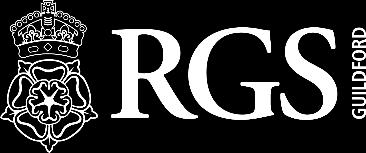
Third Form Curriculum A Guide to Third Form Study
Contents
• Foreword
• Overview
• Options
• Subject Guides
Art
Design Technology
Drama
Geography
Greek History
Latin
Modern Foreign Languages
Music
Religious Education
Other Compulsory Subjects
Personal Development
Games
Physical Education
Computational Thinking
ExAd
Foreword

The Third Form at the RGS follows on from the first two years in helping our pupils develop a love of learning for learning’s sake before the constraints of public examinations. To that extent, we give our students a unique opportunity to start to shape their own curriculum, without the additional pressure of studying for external examinations.
The ability for our students to shape their own curriculum and learning, through choosing six optional subjects - in addition to a series of compulsory academic subjects - allows us to broaden and balance the curriculum through placing emphasis on pupils’ physical and mental wellbeing - two of our central tenets of education here at the RGS, where our belief that a happy child makes a successful child runs true.
Childhood can often be too brief and our emphasis on the holistic education on offer in the Third Form allows our Third Formers to be stimulated in all aspects of school life, with an emphasis on developing pupils character and experiences outside of the classroom. The Life Skills and Exploration and Adventure (ExAd) courses and the associated Field Days, alongside Physical Education and Games provide ample opportunities for this.
We are conscious that the Third Form is also a time for developing new friendships and affirming existing ones. Becoming a teenager is a tricky time for young people - the Third Form at RGS allows pupils to be themselves, to explore far beyond the confines of a curriculum or classroom and to begin to form the thoughts, opinions and habits that will help them contribute and thrive to both the RGS and wider communities.
Matt Baggs Head of Lower School
Overview
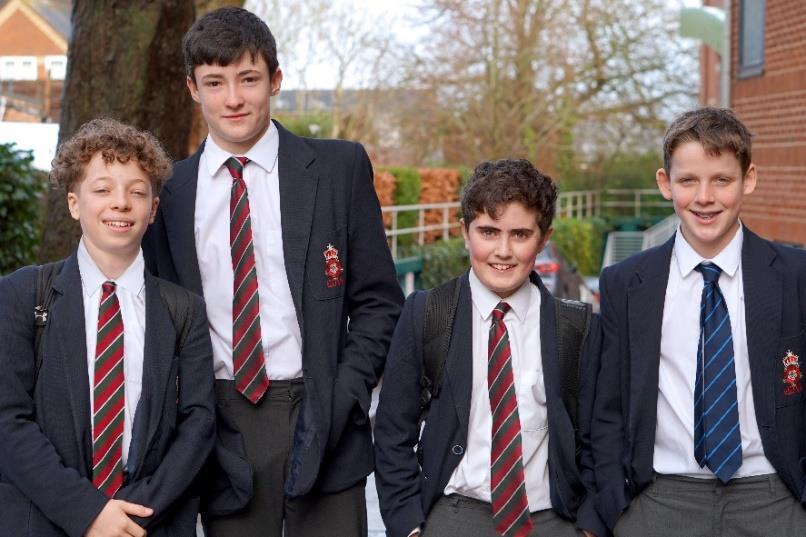
Students joining the Third Form, whether moving up from the Second Form or joining us from a different school, will find the academic curriculum to be exciting and stimulating. Our Third Form curriculum has been designed both as a bridge towards preparing students for their studies of GCSE in the Middle School, and also to help students develop a love of learning as they are empowered to study fewer subjects in greater depth.
The Third Form curriculum balances a Core of compulsory subjects with the ability to select from a wide variety of exciting Optional subjects. Whilst these Optional subjects help provide pupils with the foundational skills for studying that subject in later years, the curriculum offers our students the opportunity to immerse themselves in academic pursuits designed to draw out the very best of themselves. Whether that be through practical work, design, questioning, debate or solving problems, the Third Form curriculum offers our students the very best academic experience, without the immediate pressure of public examinations.
Nevertheless, during the middle of the Third Form, our students will be asked to indicate what GCSEs they wish to study and they will receive support from the school in making these decisions.
The RGS offers GCSEs in all of the Optional subjects contained within this curriculum booklet, and in addition offers GCSEs in Academic Physical Education and Computer Science.
We are often asked what Optional subjects a student must choose if they wish to go on to study at a higher level. It is only the case that a student is required to have studied a language with us, to select that subject at GCSE. For all other subjects, the curriculum has been designed to allow a student to take an Optional subject at GCSE without having studied it during the Third Form.
The only slight caveat to this is Geography, which uses the Third Form to cover some GCSE content in order to cover the course syllabus in time - even then, it is not unknown for students not to select Geography in the Third Form, only to select it at GCSE!
Options

The Third Form curriculum runs using a ‘2 week’ timetable. Whilst the Core subjects have a fixed allocation of periods each week, the Optional subjects are each allocated 2.5 periods. In practice, this means that each optional subject is taught over 2 periods in one week, and 3 weeks in the subsequent week.
Core compulsory subjects:
Students are required to choose six Optional subjects in total, selecting a minimum of two from Pool 1 and a minimum of three from Pool 2.
If a student wishes to study a language at GCSE, then they are required to select that subject as an Option.
Pool 1
Pool 2
Other compulsory lessons:
SUBJECT PERIOD English Language and English Literature 4 Mathematics 4 Core Modern Language (French or Spanish) 3 Biology 2 Chemistry 2 Physics 2 SUBJECT PERIOD Art 2.5 Drama 2.5 Design Technology 2.5 Music 2.5 SUBJECT PERIOD Geography 2.5 History 2.5 Religious Education 2.5 Latin French/German/Greek/Spanish 2.5 SUBJECT PERIOD Games 3 Physical Education 1 Computational Thinking 1 ExAd 1 Personal Development 2 OVERALL TOTAL 40
THIRD FORM ART AT THE RGS
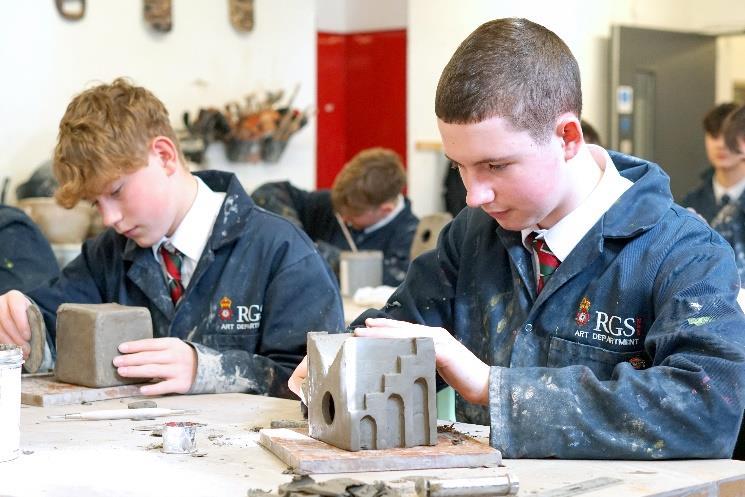
Course Outline
Art is a perfect complement to your academic studies. We have designed the Third Form lessons to be as enjoyable as possible by choosing stimulating, engaging and fun projects that appeal to students with all levels of artistic talent. Students will enjoy a creative challenge and learn new skills which will be of benefit to them in many other areas of their lives
Course Content
Each of the three terms is devoted to one of the following overarching topics:
• Linear Perspective;
• Ceramic Sculpture;
• Creative Digital Media.
In this technological age, the ability to edit digital photography, create digital images and develop your skills in visual presentations is vital for effective communication and you will be based in our Digital
Media Suite learning to use Adobe Photoshop and Google SketchUp like a professional.
Your ability to draw and visualise in threedimensions will be greatly enhanced with our intensive course in Linear Perspective. You will learn how we perceive depth and space in our threedimensional world and learn how to effectively ‘model’ a convincing illusion of volume and space on a two-dimensional (flat) surface. This is a form of technical drawing, which employs drawing instruments, that has always been immensely popular with our students, as it presents a cognitive and an artistic challenge.
Your time in the Sculpture Studio may be amongst the most enjoyable time spent at the RGS as it involves the singular pleasure of playing with mud. To be more accurate, you will learn to coil clay and to slab build it into pots and ceramic sculptures, using forms inspired by both natural objects, such as seed cases, and mechanical objects, such as machinery. You will also learn to use decorative processes such as imprinting, carving and ultimately glazing your creations.
Skills
Art in the Third Form at the RGS is both a highly enjoyable experience, and a highly valuable educational precursor to further study in the subject. Excellence is pursued at all times and regularly achieved by our students. The Art Department comprises a team of talented, dedicated, and practising artists who are very much looking forward to taking you on this exciting journey.
THIRD FORM DESIGN TECHNOLOGY AT THE RGS

Course Outline
Studying Design Technology in the Third Form will provide you with a broad introduction to a variety of areas of study, some of which you would be able to explore in greater depth at GCSE and beyond.
Course Content
Electronics: Our students develop their practical circuit building skills. You will gain further hands-on experience ‘breadboarding’ and building prototype circuits both physically and virtually, using software modelling.
You will be introduced to the concept of a systems approach to designing circuits. This means that you will be able to add more elements to your designs, incorporating movement in the form of motors and mechanical output. If you have always loved playing with Lego and using it to produce machines that move, you will already have a good idea of the kinds of things that can be achieved!
Wood: You will use a wide range of hand and machine processes to produce an acoustic ukulele. This will provide a fun and interesting vehicle for learning about craftsmanship and attention to detail.
All the project activities that you will undertake will be done according to an overarching philosophy of the iterative design process. You will learn how to go about designing increasingly more complex things, using a step-by-step design process. This will facilitate your creativity and encourage an openminded approach to your project work.
Skills
Allof the project activities that youwill undertake will be done according to an overarching philosophy of the iterative design process. You will learn how to go aboutdesigningincreasingly morecomplexthingsby using a step-by-step design process. This will facilitate your creativity and encourage an openminded approach to your project work.
THIRD FORM DRAMA AT THE RGS
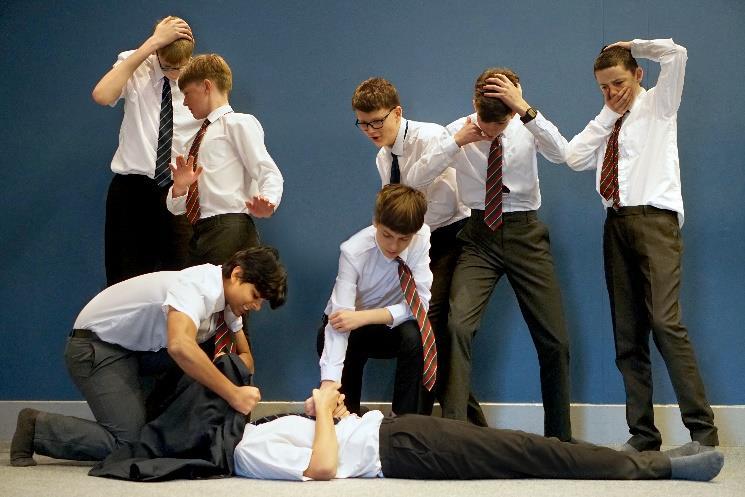
Course Outline
Drama in the Third Form introduces students to a wide range of new skills and techniques. Our aim is not to train students to be actors but rather to foster self-confidence, creative thinking, empathy, independence, and imagination through the medium of drama.
Course Content
The Notorious Case of Lizzie Borden: An issuebased unit looking at a historic murder case and using drama skills to explore notions of justice and guilt. You will learn exciting ways to investigate and tell the story and will also make connections with contemporary examples of truth and justice.
Comedy meets Tragedy: Learn and practise working with different genres and styles. As you progress through the year, you will analyse why certain structures work best for particular topics and be able to select suitable styles for their own original work.
The Elements of Theatre: Learn about lighting, sound, set and costume function in theatre through practical project work. Gain hands-on experience about set design, lighting, and sound. You will develop your own vision of a play and create the set, sound and lighting to communicate their ideas. We hope to offer all students the opportunity of a school trip to watch and reflect on a live performance.
Process: Our practical workshops introduce some essential ‘theorists’ who have developed various methods for performing and creating drama, such as physical theatre, Brecht, and Stanislavski. These approaches expand the ‘toolkit’ you will have when create your own work but also enable you to have a critical, informed understanding as consumers of live theatre.
Page to Stage: Learn how to ‘decode’ theatre scripts and develop communication and personal performance skills through working on short excerpts from contemporary plays. Work on the scripts practically and learn how texts are ‘blueprints’ for production. This analytical approach develops English Literature skills.
Devising: Devise an original drama from a stimulus, incorporating and demonstrating the techniques and approaches covered in the year. Collaboration, problem-solving and independent work become key to successful performances as well as fostering creativity and pride in your final presentations.
Skills
Throughout the year, we cover a range of topics and skills-based work to teach the subject and life skills. Students work together in small groups to develop ideas, collaborate and present to an audience.
THIRD FORM GEOGRAPHY AT THE RGS
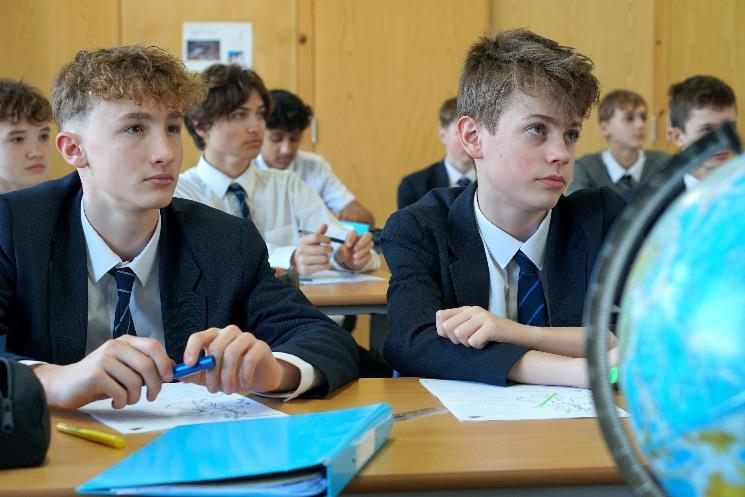
Course Outline
We begin with an in-depth analysis of one of the most important parts of our planet: The ocean. We consider their formation, their economic impact and explore issues such as modern piracy, coral reef ecosystems and the impact of over-fishing.
We then look at landforms created by rivers and glaciers in the UK, building towards our annual field trip to the Lake District in Trinity term.
Course Content
The Geography of Oceans:
• Getting to know your continental shelf from the deep abyss with an introduction to the physical Geography of the oceans.
• Finding out about the journey of explorers like Robert Ballard, who discovered the wreck of the Titanic and discovered black smokers along the Mid Atlantic Ridge.
• Learning about threats to the ocean ecosystem: plastic pollution, ocean acidification and the plight of sharks, threatened by the shark finning industry
• Understanding the causes, effects and responses to modern-day piracy.
Hazards:
• Tectonic hazards: What causes earthquakes and volcanoes? Where do they occur and how can they be managed?
• Atmospheric hazards: causes, effects and management of cyclones.
• Extreme weather in the UK
• Causes, effects and responses to climate change.
Skills
The Third Form is an opportunity to develop 'issue analysis' skills. This means looking at an issue or problem, identifying important trends and impacts related to it and then understanding how and why contrasting groups of people may think differently about thatissue.Therewillbeopportunities throughout the course to explore skills such as GIS, practising extended written responses together with analysing graphs, maps and photographs. In the Trinity term we will learn essential fieldwork skills when we look at the impact of tourism in Ambleside. There will also be opportunities to take part in various team building exercises too.
THIRD FORM GREEK AT THE RGS
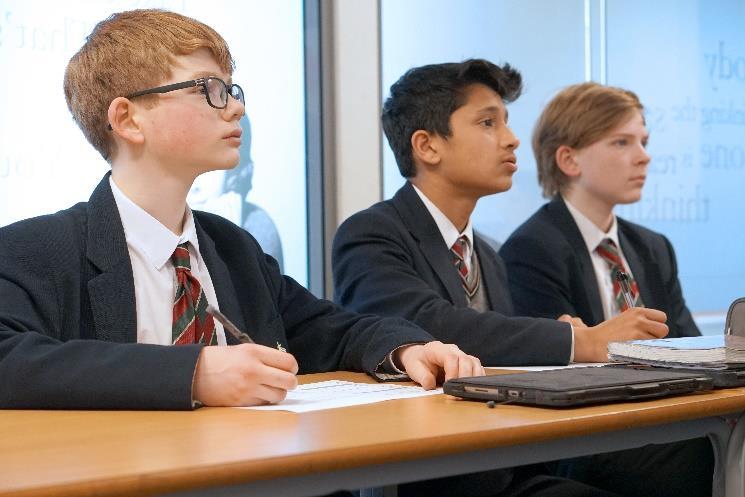
Course Outline
The Greek course is a fascinating subject embracing a variety of disciplines. In studying Greek with us you will learn about the language, mythology, philosophy and religion of this extraordinary period of history.
Course Content
Language: Whether it is interest or enjoyment, drama or philosophy, a passion for code breaking or the language of the New Testament, Greek is an intriguing language and culture. Whether you are initially daunted or attracted by the unfamiliar alphabet *, students will be reading words in Ancient Greek fluently within a couple of weeks. You will quickly discover how many of our English words have their roots in Greek. We cover essential grammar with speed, which results in being able to read stories in Ancient Greek within the first half term.
Myth: Your first introduction into the world of Ancient Greece was through the wonderful myths often studied at primary school. We delve further into this rich and intrinsically fascinating tapestry of stories by reading about Achilles the legendary Greek warrior, about the hero Odysseus and his adventures with the one-eyed Cyclops, and how Perseus tricked Medusa, who turned men to stone. Not only have these stories endured the test of time, but they are ingrained in so much of Western art, literature and culture
Ancient History and Philosophy: We learn about the birth of our alphabet and about the archaeology of bronze age Greek civilisations, which gave us heroes such as Theseus and Agamemnon. We go on to explore the birth of democracy and drama in Athens and explore what made the Spartan soldiers such ferocious opponents. We finish the year by studying Alexander the Great, who had established an empire stretching from Macedonia to Egypt and to the Indian Punjab by the time of his death at the age of 32.
*The word alphabet is derived from the first two letters in the Greek alphabet, alpha and beta.
Skills
Learning Ancient Greek helps students understand how language shapes thinking and society. Its language and literature, as well as its rich history, help us develop a greater insight into the world around us.
THIRD FORM HISTORY AT THE RGS
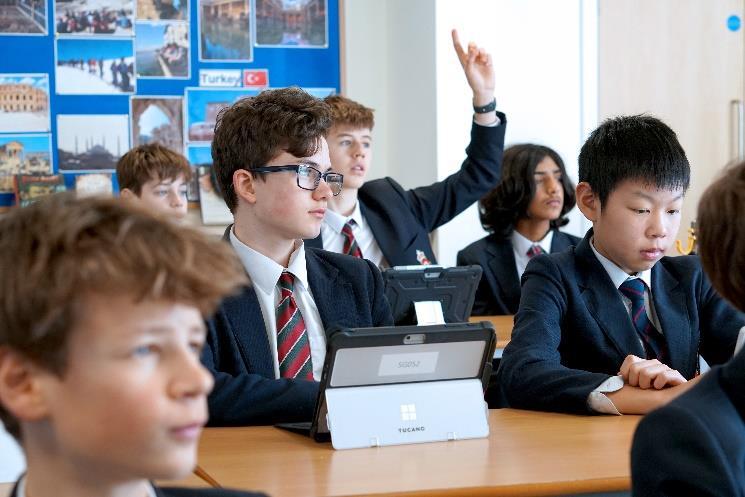
Course Outline
Third Form History gives students an exciting opportunity to understand our present world. Embarking on the modern era considering how our present world has been shaped. The History Department is constantly changing what is taught, based on what our students are interested in, developments within history, our passions and what we think is most appropriate based on current issues.
Course Content
The development of modern warfare: You will consider case studies from the Napoleonic War up to the Second World War to understand the impact the technology had on warfare and the development of total war. This not only considers how wars were fought, but also the impact that this had on civilian populations
The Holocaust: Is one of the most important topics that you will study. A very emotive topic,
you will be dealing with complex issues such as comprehending what happened and why it happened, and examining the choices that individuals made. We explore various case studies to develop a comprehensive understanding of one of the most tragic events in history.
How ordinary people won the right to vote: At the beginning of the modern era, voting was restricted to wealthy, landowning men, leaving the vast majority of the population without any say in how their country was governed. This topic allows you to understand how people in Britain have fought and made sacrifices for the right to vote for all adults today. Following on from the previous unit, you will consider Chartism and how working-class men campaigned for their voting rights before moving on to study the women's suffrage movement. You will examine the role of Suffragettes and Suffragists in campaigning for women's right to vote.
Teacher’s choice: All of the History teachers are passionate about our subject, and we want to share this with you. This gives us the opportunity to tailor lessons to a topic area that we are particularly interested in, or a topic a class wants to study.
Skills
History is a subject that teaches you critical thinking and gives you confidence in expressing your opinions. In lessons, there are lots of opportunities for debate, as we wrestle with challenging questions. There is a mixture of extended writing, alongside shorter and more creative responses to some of the issues that we study.
THIRD FORM LATIN AT THE RGS

Course Outline
Latin is a long-respected and intellectually challenging subject which ironically has never had greater relevance in a world which is defined by flexibility and transferable skills. As an inflected language, Latin demands absolute accuracy and strict precision, skills our students often need to develop.
Course Content
As well as the linguistic challenge, lively, insightful debate are at the heart of our philosophy and our course provides fertile ground for topical discussions around politics, democracy, racism and xenophobia, gender issues. The subject provides an insight into the very foundations of our historical, cultural, literary heritage and this breadth is one of the great strengths of the discipline.
Language: By the end of the Third Form, you will have covered the majority of the GCSE grammar and vocabulary. You will develop proficiency by reading entertaining and gripping stories, as we
follow our hero Quintus as he endeavours to protect the King of the Regnenses from traitors and villains. Murder, fraudulent wills, plot twists, unexpected deaths, and comic turns… all the while covering the major uses of the subjunctive, participles and the ablative!
Ancient History and Archaeology: The Third Form course is based in the provinces of Rome and Judaea under one of the most paranoid and bloodthirsty of the Roman Emperors, Domitian. We study the tactics, siege engines and weapons that made the Roman army so successful and learn how it ruthlessly crushed opposition at any cost, including the Jewish rebellion at Masada. We study the evidence from the camps across Hadrian’s Wall to help us imagine what life was like for these men who served at the very edge of the Roman Empire and what motivated them to join up from across the empire from Iraq to Croatia. We also explore modern methods of archaeology and use these skills to attempt to solve a 2,000-year-old murder mystery on Hadrian’s Wall. Finally, our course takes us to the heart of the empire in Rome, where we look at how the emperors successfully used ‘bread and circuses’ to control the people, including the ultimate symbol of Flavian propaganda, the Colosseum.
Skills
Latin embeds the key skills which are inherent in programming and coding: logic, analysis, and patterns. Through the study of language and rhetoric, Latin teaches our students the skills to persuade and engage, an advantage in every career.
THIRD FORM MODERN FOREIGN LANGUAGES AT THE RGS
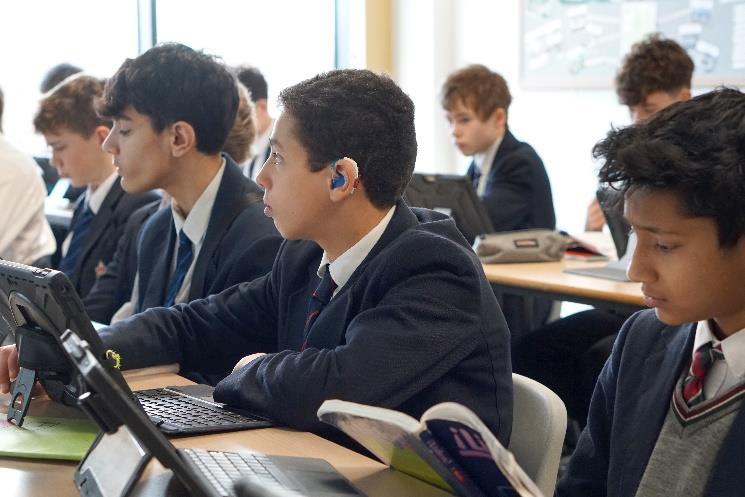
Course Outline
With the dominance of English in the modern world and the age of machine translation, it may come as a surprise that the idea of being ‘multi-lingual’ has never been more popular, nor more sought after. Learning a new language is more than enhancing job opportunities and the future. It is also about experiencing the new culture and the excitement of communicating with people from another country.
Course Content
French: This exciting and challenging course will enable you to study a wide range of topics such as the family, school, and improves your proficiency in French tenses. You will develop ideas and opinions when speaking and writing in French. Strong grammar skills are crucial in the first year, there is also opportunities to practise communication skills and discover a wide range of interesting facts about France and other French-speaking countries.
German: You will quickly learn German using existing language skills in Latin, French, or Spanish. By Christmas, you will confidently talk and write about yourself, families, and homes in German. You will master German word order, case system, and different tenses. The curriculum explores German culture, movies, and festivals beyond the syllabus. The course provides a solid foundation for the IGCSE course.
Spanish: Reflecting the lively and vibrant nature of Spanish and Latin-American culture, the course is designed to be engaging, fast paced and fun! Based on both Listos 1 and 2, there is a strong emphasis on learning how to communicate in a range of everyday life situations. Hispanic culture is explored and enjoyed in lessons, films, and extra-curricular activities and you will have the chance to explore aspects of both Spanish and Latin American cultures during every unit. Topics covered include the family, home, town, school, hobbies, and food and, whilst importance is placed on grammatical understanding, there is also a strong emphasis on cultural awareness and the ability to communicate effectively in Spanish.
Skills
Choosing to study new languages has been shown to enhance creative thinking and mental agility, regardless of the level of ability; students become more flexible in how they think, because they begin to imagine phrasing something in a different way in that other language. It is this experience of learning and enjoying a second foreign language which will help to open so many doors, both inside and outside of the classroom.
THIRD FORM MUSIC AT THE RGS

Course Outline
Music is a universal language that embodies one of the highest forms of creativity. The curriculum is designed to nurture students’ creative minds. We engage and inspire students to learn in and through music, not solely about music. The Music Department has a commitment to excellence and encouragement of all students to increase their selfconfidence, creativity and sense of achievement. As students’ progress, they develop a critical engagement with music, allowing them to compose, listen and appraise with discrimination.
Course Content
Why do we enjoy listening to music: Using examples from various musical traditions, based on the concept of Ground Bass, we learn about simple melodic and harmonic structure: the essential ingredient of a successful composition. You will have the opportunity to write and perform your own music.
What makes the perfect song: Most of the music we listen to, has lyrics. In this unit, we study how musicians combine words with melodies to create the perfect song.
All that Jazz: Exploring Jazz and Blues, the root of all pop music! Exploring the history, origins and social context of the development of Blues in the southern states of the USA. The Blues Scale introduces a new melodic resource on which we improvise using ostinato and riffs. The conclusion of the Unit will be the writing and performance of our own 12-bar Blues.
An Introduction to Music Technology: The digital world of Music. Music technology is about composing or creating music and sounds, using electronic hardware and computer software. This Unit emphasises the practical elements of music technology. Using our suite of Apple Macs, we learn the basics of BandLab, Logic Pro and Sibelius you will perform and record your own compositions.
Music and the Stage: A practical collaboration with the Drama Department. Music for film and games reinforces the power of the drama on the screen. Working alongside the Drama curriculum, we will compose and record a soundtrack to accompany a murder mystery suspense drama.
Skills
Throughout the year, students will foster transferable skills, such as teamwork, communication, critical thinking, problem solving, confidence, autonomy, tolerance and empathy. Ultimately, we want our students to have a passion for music and find great joy in this creative subject.
THIRD FORM RELIGIOUS EDUCATION AT THE RGS
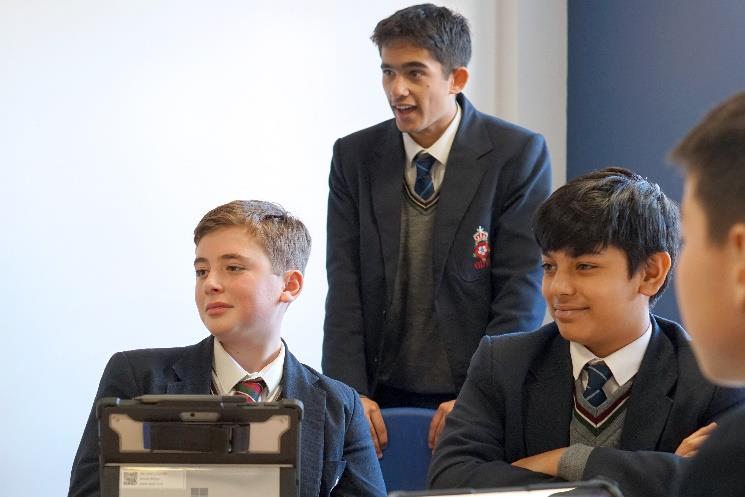
Course Outline
Third Form Religious Education is deliberately set up to introduce both some of the broader issues in the study of religion as well as continue the philosophical, ethical and religious approaches that students will be familiar with. The course is also constructed to introduce students to all of the writing and evaluative skills that lead to success in studies beyond the Third Form, as well as an introduction to some of the ideas that are explored in more depth in later study.
Course Content
Science & Religion:
• Why is science so successful?
• Origins of the universe, origins of life, miraclesthe conflicts between science and religion.
• Can we reconcile science and religion?
Philosophy of Religion:
• The philosophical debate about the existence of God.
• Ancient and modern arguments for religious belief.
• Evil, suffering and the case for atheism.
• Is ‘God’ a meaningful idea?
Social Anthropology & Religion:
• The role and function that religion has played in different societies.
• The role of myth, magic and rituals in religions.
• Voodoo, Shamanism and ‘nature religions’.
Research Project:
• Group task at the end of the year.
• Research and present on an area from the above topics.
• Groups select their own project and learn research and presentation skills.
Skills
Students do not just acquire knowledge and understanding. They learn to explain and to form their own opinions, and to defend them using evidence and reason. In this regard, the Religious Education course enablesstudentstoanalyse,thinkcriticallyandacquire debating skills.
THIRD FORM OTHER COMPULSORY SUBJECTS AT THE RGS
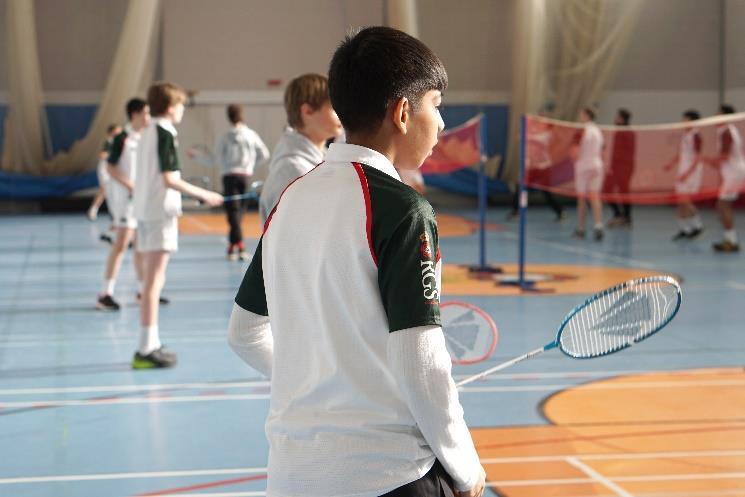
Course Outline
Personal Development
Third Form Personal Development lessons are a key part of the School’s commitment to the Spiritual, Moral, Social and Cultural development of our students. There are two main strands to these lessons: Personal, Social, Health and Moral Education (PSHME) and Spiritual & Moral Development. These two strands are mutually supportive, each drawing on skills and knowledge developed in the other strand.
The course is non-examined, and there is no homework, and no grades or reports. The emphasis is on students engaging with important factual material in order to build the personal skills, competencies and worldview needed for a productive and rewarding future. PSHME content is delivered by Form Tutors, Spiritual and Moral Development content is taught by the members of the Religion and Philosophy Department who also have PSHME training; other specialists are included
as appropriate. All lessons aim to promote critical thinking and analysis, self-reflection and character building, and personal wellbeing and responsibility; they also provide opportunity to develop and practise a range of study and presentation skills.
PSHME
Building on foundational work in the First and Second Form curriculum, and leading into the Middle School PSHME programme, the syllabus is based around broad themes:
• Health and Wellbeing: Includes work on mental health and emotional wellbeing, as well as maintaining a healthy lifestyle. Topics might include managing stress and developing a positive body image.
• Relationships: The emphasis throughout is on developing positive and fruitful relationships.
• Living in the Wider World: Students will consider employment pathways, making informed financial choices and developing skills that employers value. Media literacy and digital resilience are covered in the context of gaming, gambling and the use and abuse of social media platforms, including pornography and fake news.
• Reflection: Students will be provided with opportunities to reflect on their progress and development, both in school and beyond, and to set targets for moving forward. Strategies to help achieve the targets are offered.
Spirituality and Morality
This strand of the Personal Development lessons focusses on the set of beliefs, values, attitudes, experiences and reflections which can give direction, shape and meaning to students’ lives. This requires a willingness to look beyond simple materialism, to ask and explore ultimate questions of a moral, ethical and spiritual nature, and to consider how responding to personal challenges can be assisted by having a grounded and coherent moral and spiritual worldview.
There are five topic blocks with which students will engage:
• Creating a Personal Moral Code
• Addiction & Substance Abuse – an issue in personal and social values
• Human Rights & Responsibilities
• Life, Death and Bereavement.
• British Institutions – a journey through law, democracy and justice.
Games
Games is the highlight of the week for many of our students. Our winter programme sees the students playing rugby or running cross country. Spring is hockey season with an additional option for cross country. Summer allows us to play cricket, with an option to do athletics or tennis. The School has a sports-for-all policy and is keen to ensure that as many students as possible represent the school in competitive fixtures.
Physical Education
Core PE encompasses a range of different sports and activities, the delivery of which aims to build athletic development, develop game understanding and provide a foundation for theoretical understanding that is developed at GCSE level. Activities rotate on a half-termly basis and include: Health related fitness, basketball, badminton, table tennis, softball and tennis.
Computational Thinking
All students in the Third Form will study one period per week of Computational Thinking. The course is designed to develop problem-solving skills and techniques that software engineers use to write programs and apps. It also gives students a flavour of the programming side of the Computer Science GCSE course.
In the Autumn Term students will learn how to program in Python3, using their skills to solve a variety of problems.
In the Spring Term, students will learn to use cell references and formula in Microsoft Excel, using these towards the end of the term to analyse real-data sets.
In the Summer Term students will revise using both skills as well as working on small projects.
All students will additionally be entered for the Bebras Computational Thinking Challenge which takes place in lesson time, success in which leads to qualification for the Oxford University Computing Challenge
ExAd
All students in the Third Form and above take part in the ExAd programme, an outdoor and expedition training programme. The training covers a variety of practical skills and provide the opportunity to gain numerous accredited awards. It will also cover the requirements of the expedition section of the Bronze Duke of Edinburgh Award

Royal Grammar School High Street Guildford GU1 3BB www.rgsg.co.uk

















